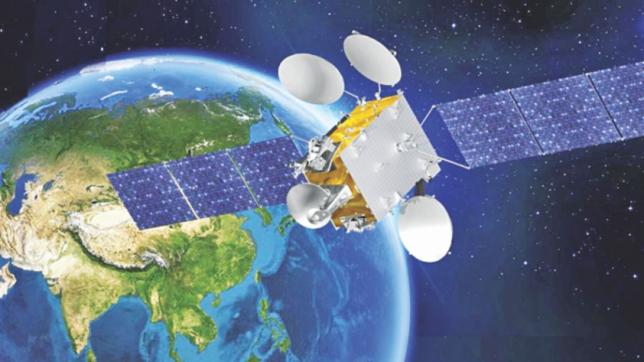TV stations to take services from next week

All the local television stations are now ready to get on board the Bangabandhu Satellite – 1 -- one year after its launch.
They will join by May 19, according to Shahjahan Mahmood, chairman of the Bangladesh Communication Satellite Company Limited (BCSCL) board.
The television channels and the lone direct-to-home (DTH) company Beximco Communications, which runs RealVU, are aking a quarter of the satellite’s capacity.
Another one-fourth of the capacity will be taken up by local agencies like the army, navy and the other government agencies, banks and some non-governmental organisations working in remote parts of the country.
The RealVU is obligated to run its operations with Bangabandhu-1 and if needed keep its transmissions suspended to get ready to connect with the satellite.
On May 12 last year, the country’s much-hyped satellite was launched to space by Falcon 9, the finest rocket of American firm SpaceX, from Florida.
But because of technical complexities and lack of sufficient preparation, the BCSCL is yet to exploit the satellite for its commercial benefits.
The satellite, which cost Tk 2,702 crore, has a lifespan of 15 years and already one-fifteenth the time have passed.
After launching the satellite to its orbital slot, it took a couple of months to adjust the connectivity with its ground stations, Mahmood said.
The BCSCL got the charge of Bangabandhu-1 only in November last year and since then the government has started commercial negotiations to make it viable.
“Now, we were fully ready to run the satellite commercially. We will start with the television channels shortly,” Mahmood said, adding that it will take eight years to recoup the amount shelled out on the project.
But the point of launching the satellite was not just reaping commercial benefits. “It is also the pride of Bangladesh,” Mahmood added.
The BCSCL is also currently negotiating with the Philippines to rent out four of Bangabandhu – 1’s 40 transponders, said its officials. Nepal is also another prospective client.
Earlier in September last year, the BCSCL appointed a renowned satellite marketing company Thaicom to market and sell Bangabandhu-1 satellite’s bandwidth to six countries, including four neighbouring countries.
The response was lukewarm, according to BCSCL officials.
The satellite owner declined to disclose how much the television channels would be paying to use the Bangabandhu – 1.
But it confirmed they are getting a better deal than what they now get from Star Alliances, a Hong Kong-based satellite company that serves all the channels in Bangladesh.
However, there are hold-ups: unlike Star Alliances, the Bangabandhu-1 has no connectivity in the Middle East and Europe, said the television station owners.
“If we fully depend on Bangabandhu-1 it might force us to lose a part of our business,” said a senior official of a television station.
To address the snag, the BCSCL is negotiating with a European satellite company.
But it does not satisfactorily address the issue as the television channels would have to pay the third party. At present, they do not have to pay Star Alliances anything extra; all the regions are part of the package.
So, some television channels are also extending their agreement with Star Alliances for the next two quarters alongside Bangabandhu - 1, said officials of private television channels.
Besides, it seems there are still ample preparations left for Bangabandhu – 1 to fully go live.
“The BCSCL offered three months’ free service but we are demanding six months,” said Salauddin Salim, chief of transmission and ICT at Somoy TV.
Furthermore, both the television stations and cable operators need to go for fresh investment to broadcast with the Bangabandhu-1 as their infrastructure is modified to the frequency of Star Alliances.
“The Bangabandhu – 1 was launched on another frequency,” he said.
To address the problem, the BCSCL has already purchased about 1,500 convertors to distribute it as free to cable operators, according to Cable Operators Association of Bangladesh (COAB) President SM Anwar Parvez.
“But there are about 3,500 cable operators in Bangladesh.”
Running the television business and distributing it is a complex exercise.
“Without addressing these problems Bangabandhu-1 satellite’s service will not be acceptable,” he added.
Meanwhile, Mahmood said not only television channels but cash machines will also take Bangabandhu – 1’s service, which can take the service to Hatia Island and other isolated parts of the country.
Dutch-Bangla Bank Limited (DBBL) will soon conduct its trial run using Bangabandhu – 1’s bandwidth.
Currently there are 7,000 cash machines in the country and of them 4,800 ATMs are owned by DBBL.
The bank is planning on taking the service to remotest parts of the country with Bangabandhu – 1’s bandwidth, said a DBBL official.
“We plan on bringing the maximum number of ATMs under Bangabandhu – 1’s coverage as early as possible,” he added.
The government is also mulling over launching the Bangabandhu-2 satellite into the orbit as one satellite is not enough to make a company viable and cover all parts of the globe.
